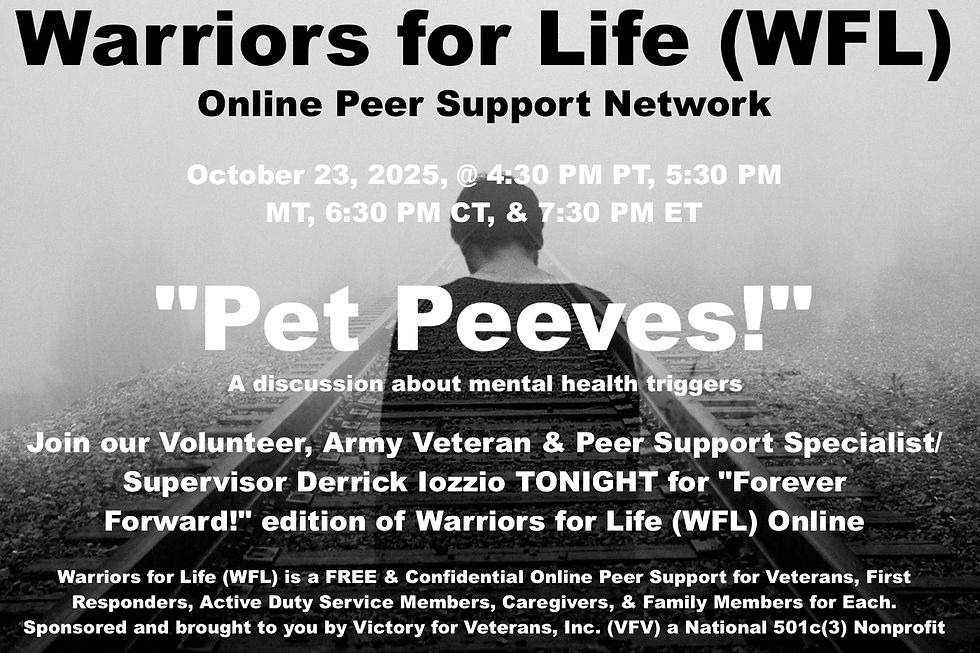Join Derrick & Friends TONIGHT for "Pet Peeves!" with Warriors for Life (WFL)
- Col (Ret) Mikel Burroughs

- Oct 22, 2025
- 3 min read
Join our Volunteer, Army Veteran & Peer Support Specialist/Supervisor Derrick Iozzio TONIGHT for "Forever Forward!" edition of Warriors for Life (WFL) Online, sponsored and presented by Victory for Veterans, Inc. (VFV).
We are asking everyone to share who we are and what support that Victory for Veterans, Inc. (VFV) is providing via WFL. If you know someone who is a veteran, first responder or a family member/caregiver, please ask them to join us for at least one meeting so they can learn more about what we do and how they can share their wisdom with others who may be able to learn from them.

TONIGHT's Topic: "Pet Peeves!"

Pet peeves are more than just minor annoyances; they can trigger stress responses that negatively impact your mental health. By understanding why these seemingly small things bother you, you can develop healthier coping strategies and increase your emotional resilience.

The psychological impact of pet peeves
Trigger the stress response: Minor triggers, such as the sound of a coworker slurping coffee, can activate your brain's "fight-or-flight" response. This causes a release of stress hormones like cortisol and adrenaline, which can lead to anxiety and mental fatigue over time.
Act like "social allergens": Similar to a physical allergy, repeated exposure to an irritating behavior can intensify your emotional response, turning a minor irritation into a major frustration.
Stem from unresolved issues: Your deep-seated frustrations may be linked to past experiences or even childhood trauma. For instance, being interrupted might be triggering if you felt ignored or unheard as a child.
Worsen relationship satisfaction: A 2014 study found that complaining about pet peeves is negatively correlated with happiness and satisfaction in a relationship. Over time, these unmanaged frustrations can build up and strain your relationships.


Strategies for managing pet peeves
You can transform your response to pet peeves from a negative reaction to an opportunity for self-awareness and growth.
Internal strategies
Practice mindfulness: When an irritation arises, take a moment to pause and notice your feelings without judgment. Deep breathing and meditation can help you break the cycle of negative rumination.
Find the "why": Identify your triggers and explore the root of your frustration. Instead of dismissing your feelings, get curious about why a particular behavior bothers you so much.
Reframe your perspective: Ask yourself if this annoyance will matter a week from now. Shifting your focus to a broader perspective helps you see that some issues are not worth your energy.
Release what you can't control: Focus on your own reaction rather than trying to change someone else's behavior. Acknowledging that you can't control everything can reduce feelings of helplessness.
External strategies
Communicate with care: For a persistent issue, address the behavior directly but gently. Use "I" statements to explain how the action affects you, rather than making accusations.
Example: Instead of saying, "You're so lazy for leaving your socks on the floor," try, "When I see socks on the floor, I feel a little frustrated".
Set healthy boundaries: If a person or situation is consistently causing stress, it may be time to set a boundary. This might involve changing your routine or even putting on noise-canceling headphones.
Seek professional help: For severe reactions or when a pet peeve is linked to a deeper mental health concern, talking to a licensed therapist can help. A therapist can provide tools like cognitive behavioral therapy (CBT) to help you manage your responses.
Warriors for Life (WFL) Online "Forever Forward!" edition presented by Victory for Veterans, Inc. (VFV) — Thursday (TONIGHT), October 23, 2025, @ 4:30 PM PT, 5:30 PM MT, 6:30 PM CT, & 7:30 PM ET
Join Zoom Meeting: https://us06web.zoom.us/j/81682532691
Thank you,
Derrick Iozzio,
Army Veteran, Peer Support Specialist/Supervisor, Catch 22 Peer Support Founder, & Volunteer Facilitator, Victory for Veterans, Inc. (VFV)









Comments